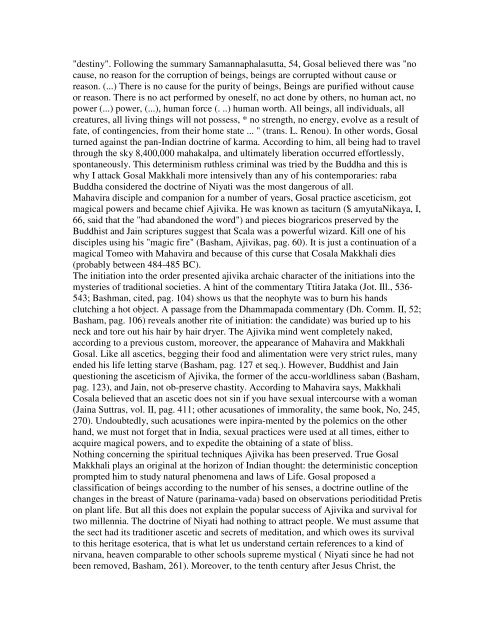Mircea Eliade YOGA IMMORTALITY AND ... - Brihaspati.net
Mircea Eliade YOGA IMMORTALITY AND ... - Brihaspati.net
Mircea Eliade YOGA IMMORTALITY AND ... - Brihaspati.net
You also want an ePaper? Increase the reach of your titles
YUMPU automatically turns print PDFs into web optimized ePapers that Google loves.
"destiny". Following the summary Samannaphalasutta, 54, Gosal believed there was "no<br />
cause, no reason for the corruption of beings, beings are corrupted without cause or<br />
reason. (...) There is no cause for the purity of beings, Beings are purified without cause<br />
or reason. There is no act performed by oneself, no act done by others, no human act, no<br />
power (...) power, (...), human force (. ..) human worth. All beings, all individuals, all<br />
creatures, all living things will not possess, * no strength, no energy, evolve as a result of<br />
fate, of contingencies, from their home state ... " (trans. L. Renou). In other words, Gosal<br />
turned against the pan-Indian doctrine of karma. According to him, all being had to travel<br />
through the sky 8,400,000 mahakalpa, and ultimately liberation occurred effortlessly,<br />
spontaneously. This determinism ruthless criminal was tried by the Buddha and this is<br />
why I attack Gosal Makkhali more intensively than any of his contemporaries: raba<br />
Buddha considered the doctrine of Niyati was the most dangerous of all.<br />
Mahavira disciple and companion for a number of years, Gosal practice asceticism, got<br />
magical powers and became chief Ajivika. He was known as taciturn ($ amyutaNikaya, I,<br />
66, said that the "had abandoned the word") and pieces biograricos preserved by the<br />
Buddhist and Jain scriptures suggest that Scala was a powerful wizard. Kill one of his<br />
disciples using his "magic fire" (Basham, Ajivikas, pag. 60). It is just a continuation of a<br />
magical Tomeo with Mahavira and because of this curse that Cosala Makkhali dies<br />
(probably between 484-485 BC).<br />
The initiation into the order presented ajivika archaic character of the initiations into the<br />
mysteries of traditional societies. A hint of the commentary Ttitira Jataka (Jot. Ill., 536-<br />
543; Bashman, cited, pag. 104) shows us that the neophyte was to burn his hands<br />
clutching a hot object. A passage from the Dhammapada commentary (Dh. Comm. II, 52;<br />
Basham, pag. 106) reveals another rite of initiation: the candidate) was buried up to his<br />
neck and tore out his hair by hair dryer. The Ajivika mind went completely naked,<br />
according to a previous custom, moreover, the appearance of Mahavira and Makkhali<br />
Gosal. Like all ascetics, begging their food and alimentation were very strict rules, many<br />
ended his life letting starve (Basham, pag. 127 et seq.). However, Buddhist and Jain<br />
questioning the asceticism of Ajivika, the former of the accu-worldliness saban (Basham,<br />
pag. 123), and Jain, not ob-preserve chastity. According to Mahavira says, Makkhali<br />
Cosala believed that an ascetic does not sin if you have sexual intercourse with a woman<br />
(Jaina Suttras, vol. II, pag. 411; other acusationes of immorality, the same book, No, 245,<br />
270). Undoubtedly, such acusationes were inpira-mented by the polemics on the other<br />
hand, we must not forget that in India, sexual practices were used at all times, either to<br />
acquire magical powers, and to expedite the obtaining of a state of bliss.<br />
Nothing concerning the spiritual techniques Ajivika has been preserved. True Gosal<br />
Makkhali plays an original at the horizon of Indian thought: the deterministic conception<br />
prompted him to study natural phenomena and laws of Life. Gosal proposed a<br />
classification of beings according to the number of his senses, a doctrine outline of the<br />
changes in the breast of Nature (parinama-vada) based on observations perioditidad Pretis<br />
on plant life. But all this does not explain the popular success of Ajivika and survival for<br />
two millennia. The doctrine of Niyati had nothing to attract people. We must assume that<br />
the sect had its traditioner ascetic and secrets of meditation, and which owes its survival<br />
to this heritage esoterica, that is what let us understand certain references to a kind of<br />
nirvana, heaven comparable to other schools supreme mystical ( Niyati since he had not<br />
been removed, Basham, 261). Moreover, to the tenth century after Jesus Christ, the







